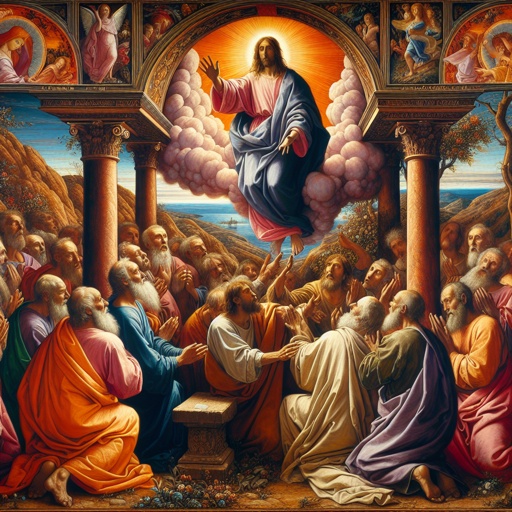What does Luke 9:25 mean?
"For what is a man advantaged, if he gain the whole world, and lose himself, or be cast away?" - Luke 9:25

Luke 9:25 - "For what is a man advantaged, if he gain the whole world, and lose himself, or be cast away?"
Luke 9:25 reads in the King James Version (KJV): "For what is a man advantaged, if he gain the whole world, and lose himself, or be cast away?"
This verse is found within the larger context of Jesus' teachings to his disciples and the crowds that followed him. Throughout this chapter of Luke, Jesus is speaking about the cost of following him as a disciple. He tells his disciples that they must deny themselves, take up their cross daily, and follow him (Luke 9:23). This verse comes immediately after Jesus' statement that whoever loses their life for his sake will save it (Luke 9:24).
In this verse, Jesus is posing a rhetorical question to his audience, asking them to consider the value of gaining the whole world if it means losing oneself or being cast away. The verse raises important questions about the meaning of life, the pursuit of worldly success, and the ultimate fate of the soul.
One of the key themes in this verse is the contrast between temporal and eternal values. It speaks to the idea that worldly success and material gain are ultimately worthless if they come at the expense of losing one's soul. It challenges the audience to evaluate their priorities and consider what is truly valuable in the grand scheme of things.
The verse also emphasizes the concept of self-identity and integrity. It warns against compromising one's true self or values in pursuit of external achievements. It stresses the importance of remaining true to one's identity and not losing oneself in the pursuit of worldly success.
Furthermore, this verse can be seen as a commentary on the fleeting nature of earthly riches and the ultimate insignificance of material possessions in light of eternity. It echoes Jesus' teachings elsewhere in the Gospels about the dangers of greed and the deceitfulness of wealth. It points to the idea that spiritual wealth and the condition of one's soul are of far greater significance than any amount of material wealth.
The symbolism in this verse lies in the contrasting images of gaining the whole world and losing oneself. The "whole world" can be seen as a symbol of all the temporal treasures, honors, and pleasures that the world has to offer. It represents the fleeting and transient nature of worldly success. On the other hand, "losing oneself" can be understood as a symbol of forsaking one's true identity, values, and spiritual well-being in the pursuit of these external gains.
In the larger context of Jesus' teachings, this verse serves as a strong exhortation to prioritize spiritual values over temporal ones, and to weigh the cost of discipleship against the allure of worldly success. It challenges the audience to consider the true worth of their lives and the importance of aligning their values with the eternal kingdom of God.
Ultimately, Luke 9:25 encapsulates profound spiritual truths about the nature of earthly pursuits, the value of the soul, and the ultimate priorities of life. It calls for introspection, self-examination, and a reevaluation of one's values in light of the eternal perspective. It stands as a timeless and universal reminder to seek first the kingdom of God, and to treasure the things that have eternal significance.
Luke 9:25 Artwork

Luke 9:25 - "For what is a man advantaged, if he gain the whole world, and lose himself, or be cast away?"

Luke 12:25-26

Luke 12:25-26

Luke 12:25-26

Luke 12:25-26

Luke 12:25-26

Luke 12:25-26

Luke 12:25-26

Luke 9:54-55

1 Corinthians 9:25-27

1 Corinthians 9:25-27

1 Corinthians 9:25-27

1 Corinthians 9:25-27

Luke 11:25 - "And when he cometh, he findeth it swept and garnished."

Luke 19:25 - "(And they said unto him, Lord, he hath ten pounds.)"

Luke 17:25 - "But first must he suffer many things, and be rejected of this generation."

Luke 14:25 - "¶ And there went great multitudes with him: and he turned, and said unto them,"

Luke 12:25 - "And which of you with taking thought can add to his stature one cubit?"

Numbers 25:9 - "And those that died in the plague were twenty and four thousand."

Luke 9:4 - "And whatsoever house ye enter into, there abide, and thence depart."

Luke 9:15 - "And they did so, and made them all sit down."

Luke 18:25 - "For it is easier for a camel to go through a needle's eye, than for a rich man to enter into the kingdom of God."

Luke 9:40 - "And I besought thy disciples to cast him out; and they could not."

Luke 22:9 - "And they said unto him, Where wilt thou that we prepare?"

Luke 9:2 - "And he sent them to preach the kingdom of God, and to heal the sick."

Luke 8:9 - "And his disciples asked him, saying, What might this parable be?"

Luke 13:9 - "And if it bear fruit, well: and if not, then after that thou shalt cut it down."

Luke 9:46 - "¶ Then there arose a reasoning among them, which of them should be greatest."

Luke 9:9 - "And Herod said, John have I beheaded: but who is this, of whom I hear such things? And he desired to see him."

Psalms 25:9 - "The meek will he guide in judgment: and the meek will he teach his way."